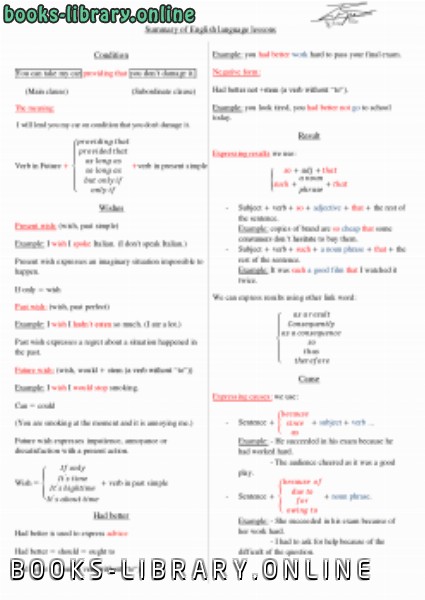📘 قراءة مذكّرة Summary of English language lessons أونلاين


ملخص دروس اللغة الإنجليزية
تأليف: ياسين للأبد
ملخص دروس اللغة الإنجليزية
تأليف:
ياسين للأبد
ملخص اللغة الإنجليزية lessonsCondition
يمكنك أن تستقل سيارتي شريطة أن
كنت
لا
يلحق الضرر به. (فقرة رئيسية) (فقرة ثانوية)
المعنى: سأعيرك سيارتي بشرط ألا تتلفها.
الفعل في المستقبل
verb in present simple
Wishes
Present wish: (wish, past simple) Example: I wish I spoke Italian. (I don't speak Italian.) Present wish expresses an imaginary situation impossible to happen. If only
=
wish Past wish: (wish, past perfect) Example: I wish I
hadn’t eaten
so much. (I ate a lot.)Past wish expresses a regret about a situation happened in the past. Future wish: (wish, would
+
stem (a verb without “to”))
Example: I wish I would stop smoking. Can
=
could (You are smoking at the moment and it is annoying me.)Future wish expresses impatience, annoyance or dissatisfaction with a present action. Wish
=
+
verb in past simple
Had better
Had better is used to express adviceHad better
=
should
=
ought to Had better
+
stem (a verb without “to”)
Example: you had better work hard to pass your final exam. Negative form: Had
better not +stem (a verb without “to”)
. Example: you look tired, you had better not go to schooltoday.
Result
Expressing results we use:
-Subject
+
verb
+
so
+
adjective
+
that
+
the rest of the sentence. Example: copies of brand are so cheap that some
consumers don’t hesitate to
buy them. -Subject
+
verb
+
such
+
a noun phrase
+
that
+
therest of the sentence. Example: It was such a good film that I watched ittwice. We canexpress results using other link word:
Cause
Expressing causes: we use:
-
Sentence
+
+
subject
+
verb
…
Example: - He succeeded in his exam because he had worked hard. - The audience cheered as it was a good play. -
Sentence
+
+
noun phrase. Example: - She succeeded in his exam because of her work hard. - I had to ask for help because of thedifficult of the question.
You're reading a preview. Unlock full access with a free trial.
Pages 2 to 11 are not shown in this preview.
Download With Free Trial
Summary of English language lessonsModals
These modals express: -
⟼
Strong obligation
⟼
Prohibition “forbidden”
-
⟼
Necessity
-
′
′
⟼
Lack (absence) of obligation -
⟼
Advice
-
⟼
Remote possibility
(15%)
-
⟼
Possibility
(50%)
-
Probability
(80%)
-
⟼
Certainty
(100%)
The “in
g” for
m:
As a past of verb called participle. Examples:
I’m
waiting
, I’m
playing.
As a noun or gerund.
Example: The eating
of GMF’s might harmful.
As an adjective. Example: This book is more interesting than that one.
Stative (state) & action verb
A state verb: is a verb which describes a states (has not awell defined beginning & the end) Examples: like, agree, believe, dislike, deserve, love, enjoy, prefer, hate, dread, and mind.
A state verb is usually use in the present form
A state verb can’t be progressive
(Continuous
form (“ing” form)).
An action verb: is a verb which describes an action or anevent (has a specific beginning & the end). Examples: go, stop, come, start, achieve, write, win,Describe, Search, and Replace.
An action verb can be used in simple and continuous
form (“ing” form)
(progressive)
Prefix & suffix
Prefix: it comes before the word and changes its meaning. -
OppositesAgree
⟼
disagree Moral
⟼
immoral Legal
⟼
illegal Fair
⟼
unfair Direct
⟼
indirect Responsible
⟼
ir responsible Suffix: it comes after the word and changes its form to anadjective, an adverb, a noun, a verb. Exam
ple: -
The suffix “
ty
” is added to an adjective to form a noun
. Stupid
⟼
Stupidity -
The suffix “
y
” is
added to a noun to form an adjective.
Spice
⟼
Spicy Conditionals
We have four types of conditionals:Type zero: T
0
If
+
Verb in present simple, Verb in present simple. Eg: If you heat water, it boils.
T
0
is used to describe a general or scientific truth.Type one: T
1
If
+
Verb in present simple, verb in future (will
+
stem)Eg: If she works hard, she will go to university.
The situation in T
1
is possible to happen.Type two: T
2
If
+
Verb in past simple, would
+
stem Eg: If I were you, I would buy a car.
The situation in T
2
is impossible to happen (animaginary situation).
You're Reading a Preview
Unlock full access with a free trial.
Download With Free Trial
Summary of English language lessons
Type three: T
3
If
+
Verb in past perfect, would have
+
past participleE
g: If I had read the question well, I would have taken the best mark.
The situation in T
3
is a regret about an event that hadhappened in the past
Quantifiers
-
for countable nouns.-
for uncountable nouns.-
for countable & uncountable nouns(both).
=
(It’s the
right quantity).
=
(It isn’t the right quantity)
. The excessive and the insufficient of something:An excessive amount:
An insufficient amount:
Used for & Used to
are verbs used to describe purpose and function of objects
Used to
+
stem
(a verb without “to”)
E
g:
It’s used to cut wood.
Used for
+
verb
+
ing (gerund) Eg:
It’s used for cutting wood.
How …?
How: is a word question used for ask about dimension andsize of objects. -
How tall…?
-
How long…?
-
How high…?
-
How far…?
-
How fast…?
-
How deep…?
-
How wide…?
-
How much…?
HeightHeightHeightDistanceSpeedDepth WidthWeight
Content & structure (function) words
Sentences contain two kind of word: Content words: are necessary and contain the meaning. -
Main verb (play, go, work…).
-Nouns. -
Adjectives (serious, nice…).
-
Adverbs (carefully, quickly…).
-
Demonstratives pronouns (this, that…).
-Negative
auxiliaries (wasn’t, couldn’t…).
-Yes, No (auxiliary) questions. -Wh questions. Structure (function) words: they make the sentences correctgrammatically. -
Pronouns (I, he, they…)
. - Prepositions
(on, the, at, to, under…)
. -Articles (a, an, the). -Conjunctions
(but, and, because…)
. -
Auxiliary verbs (is, are, do, have, can…)
. Note:
Content words are stressed.Structure words are not stressed.
Comparatives & superlatives
Comparatives We must have two elements to compare. -
Superiority Short adjectives: adjectives of one syllableAdj
+
er
+
than (Eg: she is taller than me.) Long adjectives: adjectives of two or more syllables More
+
adj
+
than (Eg: meat is more expensive than chicken.) -
Equality As
+
adj
+
as (she is as intelligent as her brother.) -
Inferiority: Less
+
adj
+
than (he is less intelligent than me.) Not as
+
صفة
+
مثل (حديقتنا ليست كبيرة مثل حديقتك). ليس ذلك
+
صفة
+
كما
أنت تقرأ معاينة
افتح الوصول الكامل مع نسخة تجريبية مجانية.
تنزيل مع
نسخة تجريبية مجانية تقرأ معاينة
افتح الوصول الكامل مع نسخة تجريبية مجانية.
تنزيل مع
نسخة تجريبية مجانية تقرأ معاينة
افتح الوصول الكامل مع نسخة تجريبية مجانية.
تنزيل مع نسخة تجريبية مجانية
حجم الكتاب عند التحميل : 439 كيلوبايت .
نوع الكتاب : pdf.
عداد القراءة:
اذا اعجبك الكتاب فضلاً اضغط على أعجبني و يمكنك تحميله من هنا:

شكرًا لمساهمتكم
شكراً لمساهمتكم معنا في الإرتقاء بمستوى المكتبة ، يمكنكم االتبليغ عن اخطاء او سوء اختيار للكتب وتصنيفها ومحتواها ، أو كتاب يُمنع نشره ، او محمي بحقوق طبع ونشر ، فضلاً قم بالتبليغ عن الكتاب المُخالف:
 قبل تحميل الكتاب ..
قبل تحميل الكتاب ..
يجب ان يتوفر لديكم برنامج تشغيل وقراءة ملفات pdf
يمكن تحميلة من هنا 'http://get.adobe.com/reader/'


 منصّة المكتبة
منصّة المكتبة